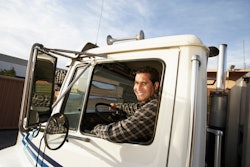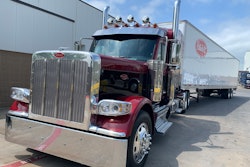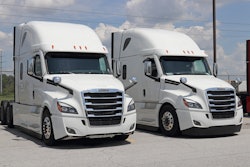Professional driver William Velasquez has 9-year-old twins that he likes to take to the park, but before he began his journey to better health he didn’t have the energy to play with them. When he was home from his time on the road, he was tired and only wanted to sit around.
“That was one of the big game changers for me is when I realized I’m losing their childhood sitting here doing nothing,” he said. “That's probably the main reason I want to be healthy and well. When they grow up, I want to be there. I don't want them to push me around in a wheelchair or carry one of those oxygen tanks around.”
Velasquez joined the Rolling Strong wellness program and lost 60 pounds. The program, designed to treat health issues specific for the trucking and transportation industry, guides him in what to eat and how to exercise, among other things. Because of the lack of healthy food options at truckstops, Velasquez said he now purchases groceries and cooks in his truck, and he has dumbbells and a trampoline in his truck to exercise with.
“We have a lack of healthy foods, a lack of sleep, places to do exercises,” he said. “We’re sitting most of the time; we spend 10 to 11 hours a day behind the wheel. That puts a strain on the body. My biggest challenge is inactivity.”
It’s no secret that truck driving is one of the unhealthiest jobs in the world – both physically and mentally. Rolling Strong President Steve Kane said during a panel on how driver health is affecting bottom lines at the American Trucking Associations Management Conference & Exhibition in San Diego this week that his goal is to take what is now recognized as the unhealthiest working population in America and turn it into the healthiest.
Kane, who boxed in college before becoming a driver and gaining weight and high blood pressure, said most companies have a wellness program, but one looks different for truck drivers than the average working population because it’s geared toward a group of remote workers with larger outcomes like accidents and death.
“Most people that are in the office, if they fall down and get hurt or something happens, that's horrible, but when a truck driver has a heart attack behind the wheel, that’s an 80,000-pound rig going down the road,” Kane said. “Do any of us in this room think that a tired, lethargic, overweight driver that gets behind the seat of the truck after eating biscuits and gravy and drinking a Big Gulp, pulling 80,000 pounds over an 11-hour period is a safe thing.”








